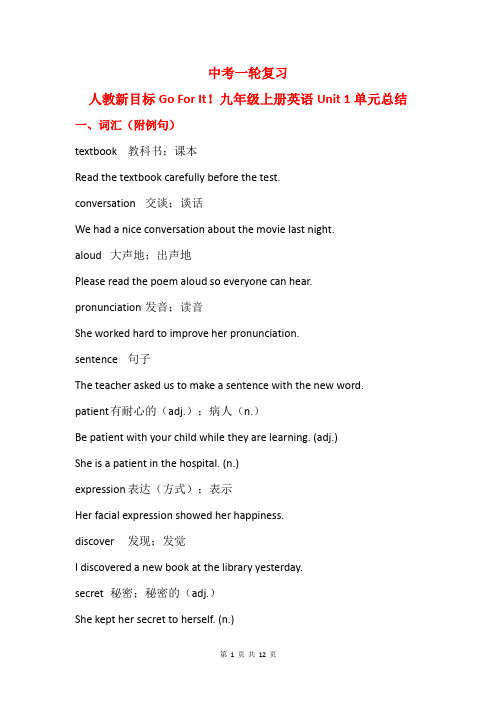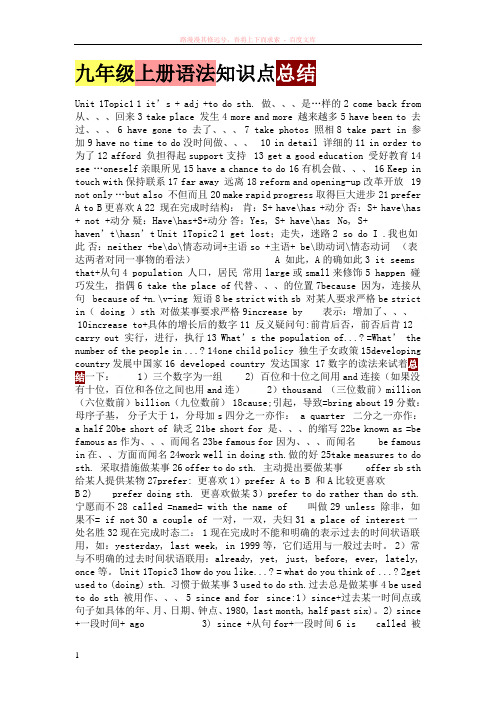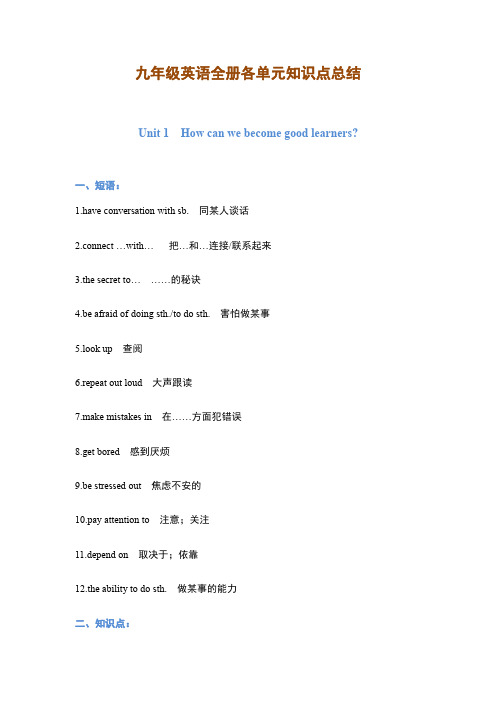九年级英语unit1语法知识点
- 格式:docx
- 大小:37.23 KB
- 文档页数:4

学生教师上课内容九年级上册Unit 1复习学科英语第()课时年级初三上课时间Unit 1课堂教学知识点Unit1 Topic1一. 语法:一) 现在完成时1. 定义:现在完成时是过去发生并且已经完成的动作对现在造成影响或后果,过去某一时间开始并一直持续到现在并且有可能还会持续的动作或状态。
2.时间词:already、just、ever、never、before、yet、in recent years / months…、in the past …years / months…、※※※so far、for + 时间段、since + 时间点/ 句子(already,just多用于肯定句中,ever,yet,never多用于疑问句和否定句中)3. 公式:主语+ have / has + V过去分词+ 其他4. 句式:肯定句:主语+ have / has + 过去分词+ 其他否定句:主语+have / has + not + 过去分词+ 其他一般疑问句:Have / Has + 主语+ V过去分词+ 其他?Yes, 主+ have / has. 或No, 主+ haven’t / hasn’t.特殊疑问句:特殊疑问词+ 一般疑问句(have / has……)5. 动词过去分词变化规则:(1) 规则变化:a. 一般情况加ed,如:helped worked played cleaned等;b. 以不发音的字母e结尾直接加d,如:used等;c. 以“辅音字母+ y ”结尾,变y为i,再加ed,如:tried studied cried carried等;注:“元音字母+ y”结尾,直接加ed;d. 以重读闭音节结尾,末尾只有一个辅音字母,双写该辅音字母,再加ed,如:dropped stopped planned除y与w结尾的;(2) 不规则变化背九上课后不规则表二) have gone to / have been to二.灵活运用(一)1.though / although 与but 不能同时出现;( because 与so不能同时出现)2.succeed in doing sth (be successful in doing sth.) 成功做某事3.not only……but also……不仅……而且……4.afford sth. 负担某物;afford to do sth. 买得起某物;5.little / a little few / a few 注:so many / much / few / little that6. 复习感叹句(常出现相关词汇:progress / experience; excellent等)1) How + 形容词/ 副词+ ( 主语+ 谓语) !2) What + a / an + 形容词+ 名词单数+ (主语+ 谓语)!What + 形容词+ 名词不可数或名词复数+ (主语+ 谓语)!(二)1.must 如:It must be fun. (还有两个表猜测用法的情态动词:may /can’t )2.take part in = join in = be in 与join区别3.不定代词+ adj. 如:something meaningful4.spend 、take、cost、pay5.in the 1960s 二十世纪六十年代in the early / late 1960s 二十世纪六十年代初/ 末6.7.others, the others , other, the other,another用法8.enough + n. adj. / adv. + enough9.put on、put up、put away三.词性转换rapid rapidly succeed success successful successfullymedicine medical please pleased (un) pleasantpleasure四.固定搭配1. take place发生,进行2. make (rapid) progress 取得(快速的)进步3. keep in touch with sb. 和某人保持联系(get in touch with sb. 和某人取得联系)4. see the changes oneself (herself / himself /……) 亲眼见证变化5. in recent years 在近几年6. satisfy people’s needs 满足人们的需求7. play chess 下象棋8. have a chance to receive a good education 有机会接受好的教育9. enjoy good medical care 享受好的医疗护理10. far away 远离的,遥远的11. by letter or telegram 通过信件或电报(by + Ving) ※※※12. play an important part in people’s lives / doing sth. 在人们的生活中/做某事起重要的作用13. in one’s spare / free time 在某人的空闲时间14. have no time to travel没时间旅行15. places of interest名胜古迹16. W hat’s more 而且17. volunteer activities 自愿者活动18. ring roads 环路19. more than forty years = over forty years 四十多年20. by the way顺便说一下五.重点句型1. Did you have a good summer holiday? 你有一个愉快的暑假吗?2. How was your trip? 你的旅行怎么样?3. Great changes have taken plac e there and my hometown has bee more and more beautiful.那儿发生了巨大的变化并且我的家乡变得越来越美了。

人教版初中英语九年级Unit 1 How can we become good learners?一单元词汇课文语法全套详解一.词汇讲解1.textbook[ˈtekstbʊk]n教科书;课本例如:We were confused by the last-minute switch in textbooks.课本在最后一刻改了,这把我们搞糊涂了。
2.Conversation[ˌkɒnvəˈseɪʃn]n.谈论;交谈例如:This conversation is now closed.这次谈话已结束。
3.Aloud[əˈlaʊd]adv.大声地;出声地Please read aloud.请大声读出来。
4.pronunciation[prəˌnʌnsiˈeɪʃn]n.发音;读音例如:He has a good pronunciation.他的发音很好。
5.Sentence[ˈsentəns]n.句子例如:This is a sentence.这是一个句子。
6.Patient[ˈpeɪʃnt]n.病人;adj.有耐心的例句:Louise was very patient with me when I was ill and crabby.在我生病并且脾气乖戾的日子里,路易斯对我很有耐心。
7.Expression[ɪkˈspreʃn]n.表达;表示;表达方式例句:she looked at her plate with an expression of disgust.她看着她的盘子,脸上露出很厌恶的表情。
8.Discover[dɪˈskʌvə(r)]V.发现,发觉例句:In the 19th century,gold was discovered in California 19世纪时,在加利福尼亚发现了金子。
9.Secret[ˈsiːkrət]adj.秘密的;保密的;n.秘密;秘诀;例句:Soldiers have been training at a secret location.士兵们一直在一个秘密场所训练。

九年级上册英语复习资料九年级英语Unit11.by+doing通过……方式如:bystudyingwithagroupby还可以表示:“在…旁”、“靠近”、“在…期间”、“用、”“经过”、“乘车”等2.talkabout谈论,议论,讨论talktosb.=talkwithsb.与某人说话3.提建议的句子:①What/howabout+doingsth.?②Whydon’tyou+dosth.?③Whynot+dosth.?④Let’s+dosth.⑤Shallwe/I+dosth.?4.too…to太…而不能常用的句型too+adj./adv.+todosthSo…to如此…以至于not…atall一点也不根本不5.be/getexcitedaboutsth.=be/getexcitedaboutdoingsth.=beexcitedtodosth.对…感兴奋6firstofall首先tobeginwith一开始lateron后来、随also也、而且(用于肯定句)常在句子的中间either也(用于否定句)常在句末too也(用于肯定句)常在句末makemistakes犯错makeup组成、构成ughatsb.笑话;取笑(某人)enjoydoingsth.喜欢做…乐意做…enjoyoneself过得愉快8.oneof+(the+形容词比较级)+名词复数形式…其中之一9.It’s+形容词+(forsb.)todosth.(对于某人来说)做某事…句中的it是形式主语,真正的主语是tostudyEnglish10.dealwith=dowith处理11.seesb./sth.do看见某人(经常)做某事seesb./sth.doing看见某人正在做某事强调正在发生12.toomany 许多修饰可数名词toomuch 许多修饰不可数名词muchtoo 太修饰形容词pare…to…把…与…相比九年级英语Unit2edtodosth.过去常常做某事否定形式:didn’tusetodosth./usednottodosth.2.反意疑问句①肯定陈述句+否定提问②否定陈述句+肯定提问④陈述句中含有否定意义的词,如:little,few,never,nothing,hardly,nobody等。

Unit 1 How can we become good learners?语法精讲语法精练I.单项填空( ) 1.(2019南通)—_______did you celebrate the Dragon Boat Festival this year, Tom?—By making rice dumplings with my Chinese friends.A. WhereB. WhenC. HowD. Why( ) 2.(2018青岛) More and more people in Qingdao go to work subway now.A. withB. onC. inD. by( ) 3. The teacher was standing the window while the students were doing their homework quietly.A. forB. onC. byD. with( ) 4. The classroom was cleaned Lucy just now.A. forB. byC. throughD. to( ) 5. You have to get home 10 o’clock.A. withB. inC. onD. by( ) 6. It’s a good idea to celebrate her _______ sending her some flowers.A. withB. byC. ofD. toII. 根据汉语意思完成句子1. 我父亲经常坐公交车支上班,我总是步行支上学。
My father often goes to work .I always go to school .2. “你怎样备考?”“我通过小组合作来学习。
”—do you study a test?—I study with a group.3. 我们在听英语时,不应该逐一地将每个单词翻译成汉语。

人教版九年级全一册英语Unit1单元语法知识点总结本单元重点短语的具体用法1. Good learners:优秀的学习者。
例如:Good learners always find ways to improve their study.(优秀的学习者总是找到方法来提高他们的学习。
)2. Work with friends:和朋友一起学习。
例如:It's better to work with friends to study.(和朋友一起学习会更好。
)3. Study for a test:备考。
例如:I need to study for the math test tomorrow.(我需要为明天的数学考试备考。
)4. Have conversations with:与……交谈。
例如:I like having conversations with my English teacher.(我喜欢和我的英语老师交谈。
)5. Speaking skills:口语技巧。
例如:Improving speaking skills requires a lot of practice.(提高口语技巧需要大量的练习。
)6. A little:有点儿。
例如:I'm a little tired today.(我今天有点儿累。
)7. At first:起初,起先。
例如:At first, I found it difficult to learn English.(起初,我发现学习英语很困难。
)8. The secret to...:……的秘诀。
例如:The secret to success is hard work.(成功的秘诀是努力工作。
)9. Because of:因为。
例如:Because of the rain, we had to cancel the picnic.(因为下雨,我们不得不取消野餐。

人教版九年级英语(全册)重点语法知识点复习梳理人教版九年级英语重点语法知识点复习梳理一.介词by的用法(Unit-1重点语法)1.意为“在……旁”,“靠近”。
Some are singing and dancing under a big tree. Some are drawing by the lake.有的在大树下唱歌跳舞。
有的在湖边画画儿。
2.意为“不迟于”,“到……时为止”。
Your son will be all right by supper time.你的儿子在晚饭前会好的。
How many English songs had you learned by the end of last term?到上个学期末你们已经学了多少首英语歌曲?3.表示方法、手段,可译作“靠”、“用”、“凭借”、“通过”、“乘坐”等。
The monkey was hanging from the tree by his tail and laughing.猴子用尾巴吊在树上哈哈大笑。
The boy’s father was so thankful that he taug ht Edison how to send messages byrailway telegraph.孩子的父亲是那末的感谢,因而他教爱迪生怎样经由过程铁路电报来转达息。
4.透露表现“逐个”,“逐批”的意思。
One by one they went past the table in the dark.他们一个一个得在黑暗中颠末这张桌子。
5.表示“根据”,“按照”的意思。
What time is it by your watch?你的表几点了?6.和take , hold等动词连用,说明接触身体的某一部分。
I took him by the hand.我拉住了他的手。
7.用于被动句中,表示行为主体,常译作“被”、“由”等。
English is spoken by many people.英语被许多人说。

知识图谱Unit 1 How can we become good learners?知识精讲一、必背词汇textbook n. 教科书;课本conversation n. 交谈;谈话aloud adv. 大声地;出声地pronunciation n. 发音;读音sentence n. 句子patient adj. 有耐心的n. 病人expression n. 表达(方式);表示discover v. 发现;发觉secret n. 秘密;秘诀adj. 秘密的;保密的grammar n. 语法repeat v. 重复;重做note n. 笔记;记录v. 注意;指出pal n. 朋友;伙伴pattern n. 模式;方式physics n. 物理;物理学chemistry n. 化学partner n. 搭档;同伴pronounce v. 发音increase v. 增加;增长speed n. 速度ability n. 能力;才能brain n. 大脑active adj. 活跃的;积极的attention n. 注意;关注connect v.(使)连接;与⋯⋯有联系overnight adv. 一夜之间;在夜间review v. & n. 回顾;复习knowledge n. 知识;学问wisely adv. 明智地;聪明地二、重点词汇1. aloud adv.in a voice loud enough to be heard例句:He read her letter aloud to the rest of the family.他把她的信大声读给家人听。
2. discover v.to find information, a place, or an object, especially for the first time(尤指首次)发现,找到例句:We searched all morning for the missing papers and finally discovered them in a drawer.我们一上午都在找那些失踪的文件,最后终于在一个抽屉里找到了。

中考一轮复习人教新目标Go For It!九年级上册英语Unit 1单元总结一、词汇(附例句)textbook教科书;课本Read the textbook carefully before the test.conversation交谈;谈话We had a nice conversation about the movie last night.aloud大声地;出声地Please read the poem aloud so everyone can hear.pronunciation发音;读音She worked hard to improve her pronunciation.sentence句子The teacher asked us to make a sentence with the new word. patient有耐心的(adj.);病人(n.)Be patient with your child while they are learning. (adj.)She is a patient in the hospital. (n.)expression表达(方式);表示Her facial expression showed her happiness.discover发现;发觉I discovered a new book at the library yesterday.secret秘密;秘密的(adj.)She kept her secret to herself. (n.)This is a secret room in the house. (adj.)grammar语法I need to brush up on my grammar skills.repeat重复;重做Repeat the steps carefully to avoid mistakes.note笔记;记录(n.);注意;指出(v.)She took notes during the lecture. (n.)Please note that the deadline is next Friday. (v.)pal朋友;伙伴(非正式用语)My best pal and I have been friends since childhood.pattern模式;方式He found a pattern in the data that helped him solve the problem. physics物理学I enjoy studying physics because it's interesting.chemistry化学Chemistry is the study of matter and its interactions.partner搭档;同伴We worked on the project as partners.memorize记住;熟记Memorize these key points for the exam.increase增加;增长The population has increased significantly in recent years.speed速度(n.);加速(v.)She drove at a high speed on the highway. (n.)He sped up the car to pass the slow traffic. (v.)ability能力;才能She has a natural ability for music.brain大脑The brain is the control center of the body.active活跃的;积极的She is an active member of the school club.attention注意;关注Pay attention to the details of the problem.connect连接;与……有联系(v.);连接(n.)Connect the wires correctly to avoid sparks. (v.)The internet allows us to connect with people around the world. (n.) overnight一夜之间;在夜间The project was completed overnight by a team of experts.review回顾;复习She spent the evening reviewing her notes for the test. knowledge知识;学问She has a wealth of knowledge in ancient history.wisely明智地;聪明地He made a wise decision to invest in that company.二、短语知识(附例句)by making word cards 通过制作单词卡片释义:这是一种学习新单词的方法,通过制作卡片来加深记忆。

人教版九年级英语Unit 1 重要语法知识点总结1.do sth. by doing sth. 通过做某事来做某事Eg:I study English by listening to tapes. 我通过听磁带来学习英语。
2.介词by的用法①.by+交通工具①by+地点,“靠近;在...旁边”Tom sits by the window in the classroom.①by+时间,“不迟于;在...之前”Mom told him to come back home by 10:00.①“由......所做”The music by Mozart is famous all over the world.①by doing sth.通过做某事I study English by reading the textbook.3.ask 相关短语①ask sb. for sth.向某人要某物。
He asked his parents for money.①ask sb. about sth.向某人询问某事Can I ask about the result of the match?我可以问一下比赛的结果吗?①ask sb.(not) to do sth.要求某人(不)做某事(被动语态)--be asked (not) to do sth.被要求(不)做某事My mother asked me not to play in the street.4.have conversations with friends in English和朋友用英语交谈5.speaking skills 口语技能spoken English 英语口语6.read aloud 朗读 a little nervous 有点儿紧张7.It’s +adj.+(for sb.)+to do sth.做某事对某人来说是怎么样的。
It’s easier for you to pay attention to it for a long time.对于你来说长时间集中注意力在它(你感兴趣的事儿)上面是也更容易的。

九年级英语一到三单元知识点Unit 1 How can we become good learners?一、重点单词。
1. textbook (n.) 教科书;课本。
2. conversation (n.) 交谈;谈话,常用于短语“have a conversation with sb.”(与某人交谈)3. aloud (adv.) 大声地;出声地。
区别于“loud”(adj. 大声的,常用来修饰名词,如a loud voice)和“loudly”(adv. 喧闹地,侧重于嘈杂、喧闹的声音)。
例如:Read aloud to practice pronunciation.(大声朗读来练习发音。
)4. pronunciation (n.) 发音;读音。
例如:His pronunciation is very good.(他的发音很好。
)5. sentence (n.) 句子。
6. patient (adj.) 有耐心的;n. 病人。
常用搭配“be patient with sb.”(对某人有耐心)。
例如:Our teacher is patient with us.(我们的老师对我们很有耐心。
)7. expression (n.) 表达(方式);表示;表情。
例如:Facial expressions can show our feelings.(面部表情能展示我们的情感。
)二、重点短语。
1. make word cards 制作单词卡片。
2. listen to tapes 听磁带。
3. ask the teacher for help 向老师求助。
4. read aloud 大声朗读。
5. have conversations with 与……交谈。
6. give a report 作报告。
7. word by word 逐字地。
8. the secret to... ……的秘诀。
例如:The secret to success is hard work.(成功的秘诀是努力工作。

初三英语第一单元知识点整理第一单元知识点整理如下:1.问候与介绍:- 问候:Hello!Hi!Good morning/afternoon/evening!- 介绍自己:My name is… I am … years old. I am from…- 介绍他人:This is my friend… He/She is…- 询问对方信息:What's your name? How old are you? Where are you from?2.国家和国籍:- 表示国家:China, the United States, Japan, etc.- 问国籍:Where are you from? I am from…3.询问个人信息:- 姓名:What is your name?- 年龄:How old are you?- 地方:Where are you from?4.表示身体部位与健康问题:- 身体部位:head, eye, nose, mouth, hand, foot等。
- 健康问题:I have a headache/cold/sore throat, etc.5.家庭成员:- 父亲:father- 母亲:mother- 兄弟姐妹:brother, sister- 祖父母:grandfather, grandmother6.职业:- 医生:doctor- 教师:teacher- 学生:student- 工程师:engineer,等等。
7.学科与科目:- 英语:English- 数学:Math- 历史:History- 地理:Geography8.时间和星期:- 时间:What time is it? It is … o'clock.- 星期:Monday, Tuesday, Wednesday, Thursday, Friday, Saturday, Sunday9.课程表达:- 上课:have classes, have English/Math/History class- 做作业:do homework10.日常活动和爱好:- 做早操:do morning exercises - 看电视:watch TV- 打篮球:play basketball- 弹吉他:play the guitar。

九年级英语Unit 1知识点与语法精讲精练词汇梳理(一)完成单词梳理:名词:1. textbook教科书;课本 2. conversation交谈;谈话 3. pronunciation发音;读音4. sentence 句子5. expression表情;表达方式6. grammar语法7. pal朋友;伙伴8. physics 物理;物理学9. chemistry 化学10. pattern 模式;方式11. speed 速度12. partner 搭档;同伴13. ability 能力;才能14. brain 大脑15. attention 注意;关注16. knowledge 知识动词:1. discover 发现;发觉 2. repeat 重复 3. memorize 记忆;记住pronounce 发音 5. increase 增加;增长 6. create 创造;创建7. connect (使)连接;与……有联系形容词:1. active 活跃的;积极的 2. lifelong 终身的;毕生的副词:1. aloud 大声地;出声地 2. overnight 一夜之间;在夜间 3. wisely 明智地;聪明地兼类词:1. patient (adj)有耐心的(n)病人 2. secret (n)秘密;秘诀(adj)秘密的3. note (n)笔记;记录(v)注意;指出4. born (v)出生(adj)天生的5. review (v/n)回顾;复习(二) 词汇变形小结:1. pronounce (v. 发音) — pronunciation (n. 发音;读音)2. patient (adj. 有耐心的) — patience (n. 耐心) — patiently (adv. 耐心地)3.express (v.表达;表示) — expression (n. 表情;表达方式)4. discover (v.发现;发觉) — discovery (n.发现)5. secret (adj. 秘密的) — secretly (adv.秘密地)6. physics (n. 物理;物理学) — physical (adj. 物理的;身体的)7. chemistry (n. 化学) — chemical (adj. 化学的)8. memorize (v. 记忆;记住) — memory (n. 回忆)9. ability (n. 能力) — able (adj. 有能力的)10. create(v. 创造;创建) — creative (adj. 有创造力的) — creation (n. 创造力)11. connect(v. 与……有联系)— connection (n. 联系)12. knowledge(n. 知识)— knowledgeable (adj. 知识渊博的)13. wise(adj. 明智的)— wisely (adv. 明智地;聪明地)【练一练】用所给词的适当形式填空1.If you don’t spend money __wisely__ (wise),you may go broke.2.Reading English aloud will help you improve your __pronunciation__(pronounce).3.It is a good idea to help parents by doing (do) something.4.I think the_expressions__ (express) on his face are very strange.5.The discovery (discover) of the stone is very important.6.He was shy and wasn’t able (ability) to make friends quickly in school.7.Everyone is born with the ability to learn, but it’s hard to learn wisely (wise).(三) 短语攻关:look up 查阅;抬头看be born with 天生具有pay attention to 注意;关注connect…with…把……和……连接read aloud 大声朗读have a conversation with 与……交谈make a sentence造句be patient with sb/sth 对某人/某事有耐心be patient to do sth 有耐心做某事the secret to ……的秘诀take notes 记笔记practice doing sth 练习做某事ask sb for help 向某人寻求帮助give a report 作报告word by word 逐字逐句study for a test 备考speaking skills 口语技能spoken English 英语口语at first 起初;开始fall in love with 爱上keep a diary 写日记spoken English 英语口语learn from 向……学习find out 查明write down 写下;记下instead of 代替;而不是make mistakes 犯错误mind maps 思维导图知识点梳理1. by reading the textbook 通过阅读课本重点:by doing sth 通过做某事【用法详解】by作介词,意为“通过”,表示方式或方法。

九年级英语知识点语法单元归纳九年级英语知识点汇总Unit11. by + doing通过……⽅式如:by studying with a groupby 还可以表⽰:“在…旁”、“靠近”、“在…期间”、“⽤、”“经过”、“乘车”等如:I live by the river. I have to go back by ten o’clock.The thief entered the room by the window.The student went to park by bus.2. talk about 谈论,议论,讨论如:The students often talk about movie after class. 学⽣们常常在课后讨论电影。
talk to sb. === talk with sb. 与某⼈说话3. 提建议的句⼦:①What/ how about +doing sth.如:What/ How about going shopping②Why don’t you + do sth.如:Why don’t you go shopping③Why not + do sth. 如:Why not go shopping④Let’s + do sth. 如:Let’s go shopping⑤Shall we/ I + do sth.如:Shall we/ I go shopping4. a lot 许多常⽤于句末如:I eat a lot. 我吃了许多。
5. too…to 太…⽽不能常⽤的句型too+adj./adv. + to do sth.如:I’m too tired to say anything. 我太累了,什么都不想说。
6. aloud, loud与loudly的⽤法三个词都与"⼤声"或"响亮"有关。
①aloud是副词,重点在出声能让⼈听见,但声⾳不⼀定很⼤,常⽤在读书或说话上。

人教版九年级英语上册各单元语法重点Unit 1:How can we become good learners?第一单元的语法重点是:"by+V-ing”结构详解;提建议的句式。
by+V-ing★“by+V-ing”结构在句子中作方式状语,常用来表示“以、靠、借助、通过、用(某种方法或手段)”而达到某种预期的目的。
该结构常用来回答How do you...?之类的问题。
★当by和表示交通工具的名词连用时,它与名词之间不用任何限定词,且名词用单数形式。
They often go to school by subway.他们经常坐地铁上学。
★by,in和with都可以表示“通过;借助”。
by后接表示动作、行为的名词;in 表示“用某种语言;用某种材料”;with后接表示物体或工具的名词。
如:You may send the book by post.你可以通过邮局把书寄出去。
提建议句式①What/how about+doing sth.?如:What/How about going shopping?②Why don't you+do sth.?如:Why don't you go shopping?③Why not+do sth.?如:Why not go shopping?④Let's+do sth.如:Let's go shopping⑤Shall we/I+do sth.?如:Shall we/I go shopping?Unit 2:I think that mooncakes are delicious!第二单元的语法重点是:宾语从句;反义疑问句;表达“花费”。
宾语从句that,if和whatever引导的宾语从句:★宾语从句中连接词的选择1.由that引导的宾语从句:that在从句中无词义,不作任何成分,常可省略。
如:Jenny said(that)she could finish her painting before supper.I think(that)you are right.2.由if或whether引导的宾语从句:if或whether引导宾语从句时,一般可通用,都表示“是否”。

九年级上册语法知识点总结Unit 1Topic11 it’s + adj +to do sth. 做、、、是…样的2 come back from 从、、、回来3 take place 发生4 more and more 越来越多5 have been to 去过、、、6 have gone to 去了、、、7 take photos 照相8 take part in 参加9 have no time to do没时间做、、、10 in detail 详细的11 in order to 为了12 afford 负担得起support支持13 get a good education 受好教育14 see …oneself亲眼所见15 have a chance to do 16有机会做、、、16 Keep in touch with保持联系17 far away 远离18 reform and opening-up改革开放19 not only …but also 不但而且20 make rapid progress取得巨大进步21 prefer A to B更喜欢A 22 现在完成时结构:肯:S+ have\has +动分否:S+ have\has + not +动分疑:Have\has+S+动分答:Yes, S+ have\has No, S+haven’t\hasn’t Unit 1Topic2 1 get lost;走失,迷路2 so do I .我也如此否:neither +be\do\情态动词+主语so +主语+ be\助动词\情态动词(表达两者对同一事物的看法) A 如此,A的确如此3 it seems that+从句4 population 人口,居民常用large或small来修饰5 happen 碰巧发生, 指偶6 take the place of代替、、、的位置7because 因为,连接从句because of +n.\v-ing 短语8 be strict with sb 对某人要求严格be strict in( doing )sth 对做某事要求严格9increase by 表示:增加了、、、10increase to+具体的增长后的数字11 反义疑问句:前肯后否,前否后肯12 carry out 实行,进行,执行13 What’s the population of...? =What’ the number of the people in ...? 14one child policy 独生子女政策15developing country发展中国家16 developed country 发达国家17数字的读法来试着总结一下:1)三个数字为一组2) 百位和十位之间用and连接(如果没有十位,百位和各位之间也用and连)2)thousand (三位数前)million (六位数前)billion(九位数前)18cause;引起,导致=bring about 19分数:母序子基,分子大于1,分母加s 四分之一亦作: a quarter 二分之一亦作:a half 20be short of 缺乏21be short for 是、、、的缩写22be known as =be famous as作为、、、而闻名23be famous for因为、、、而闻名be famous in在、、方面而闻名24work well in doing sth.做的好25take measures to do sth. 采取措施做某事26 offer to do sth. 主动提出要做某事offer sb sth 给某人提供某物27prefer: 更喜欢1)prefer A to B 和A比较更喜欢B 2) prefer doing sth. 更喜欢做某3)prefer to do rather than do sth.宁愿而不28 called =named= with the name of 叫做29 unless 除非,如果不= if not 30 a couple of 一对,一双,夫妇31 a place of interest一处名胜32现在完成时态二:1现在完成时不能和明确的表示过去的时间状语联用,如:yesterday, last week, in 1999等,它们适用与一般过去时。


九年级英语unit1知识点笔记在九年级的英语学习中,Unit1是非常重要的一个单元,它包括了很多基础的语法和词汇知识,是我们后续学习的基础。
在这篇文章中,我将为大家总结九年级英语Unit1的知识点。
一、动词时态1.一般现在时:表示经常性的、习惯性的或普遍的动作、状态。
2.一般过去时:表示过去某个时间发生的动作。
3.一般将来时:表示将来某个时间将要发生的动作。
动词时态是英语中非常基础的部分,也是我们需要掌握和运用的重要知识点。
在学习中,我们可以通过语境和练习来加强对动词时态的掌握。
二、冠词冠词分为定冠词和不定冠词,定冠词包括"the",不定冠词包括"a"和"an"。
冠词在句子中起到限定名词的作用,能帮助我们更准确地表达意思。
在使用时,我们需要注意单复数和名词的首字母等情况,以便正确选择和运用冠词。
三、形容词和副词的比较级和最高级1.比较级:用于比较两个人或物的特征,形容词的比较级通常在词尾加上-er,或在前面加more。
2.最高级:用于比较三个或三个以上人或物的特征,形容词的最高级通常在词尾加上-est,或在前面加most。
形容词和副词的比较级和最高级是用来描述人或事物的特征或程度的。
掌握好这一部分的知识,对于我们的写作和口语表达都非常重要。
四、名词的单复数名词的单复数变化规则比较多,有一些名词的变化规则需要特别注意。
比如,以-f或-fe结尾的名词,变为复数时,通常把f或fe变为v,再加-es。
在写作和阅读时,我们需要注意名词的单复数变化,以便准确地表达意思。
五、介词介词在英语中是非常重要的一部分,它用来表示时间、地点、方向、原因等概念。
常见的介词有in、on、at、by等。
学习介词需要通过大量的语境练习,同时还需要注意介词与名词之间的搭配,以及一些特殊用法。
以上就是九年级英语Unit1的知识点笔记,希望能对大家的学习有所帮助。
英语学习是一个循序渐进的过程,只有掌握好基础,才能在后续学习中更好地应用和拓展。

九年级英语全册各单元知识点总结Unit1How can we become good learners?一、短语:1.have conversation with sb.同某人谈话2.connect…with…把…和…连接/联系起来3.the secret to………的秘诀4.be afraid of doing sth./to do sth.害怕做某事5.look up查阅6.repeat out loud大声跟读7.make mistakes in在……方面犯错误8.get bored感到厌烦9.be stressed out焦虑不安的10.pay attention to注意;关注11.depend on取决于;依靠12.the ability to do sth.做某事的能力二、知识点:1.by+doing:通过……方式(by是介词,后面要跟动名词,也就是动词的ing形式);2.a lot:许多,常用于句末;3.aloud,loud与loudly的用法,三个词都与“大声”或“响亮”有关。
(1)aloud是副词,通常放在动词之后。
(2)loud可作形容词或副词。
用作副词时,常与speak,talk,laugh等动词连用,多用于比较级,须放在动词之后。
(3)loudly是副词,与loud同义,有时两者可替换使用,可位于动词之前或之后。
4.not…at all:一点也不,根本不,not经常可以和助动词结合在一起,at all则放在句尾;5.be/get excited about sth.:对…感到兴奋;6.end up doing sth:终止/结束做某事;end up with sth.:以…结束;7.first of all:首先(这个短语可用在作文中,使得文章有层次);8.make mistakes:犯错make a mistake犯一个错误;ugh at sb.:笑话;取笑(某人)(常见短语)10.take notes:做笔记/记录;11.native speaker说本国语的人;12.make up:组成、构成;13.deal with:处理、应付;14.perhaps=maybe:也许;15.go by:(时间)过去;16.each other:彼此;17.regard…as…:把…看作为…;18.change…into…:将…变为…;19.with the help of sb.=with one's help在某人的帮助下(注意介词of和with,容易出题)pare…to…:把…比作…compare with拿…和…作比较;21.instead:代替,用在句末,副词;instead of sth/doing sth:代替,而不是(这个地方考的较多的就是instead of doing sth,也就是说如果of后面跟动词时,要用动名词形式,也就是动词的ing形式)22.Shall we/I+do sth.?我们/我…好吗?23.too…to:太…而不能,常用的句型是too+形容词/副词+to do sth.Unit2I think that moon cakes are delicious!一、短语:1.the Lantern Festival元宵节2.the Dragon Boat Festival端午节3.the Water Festival泼水节4.remind sb.of使某人想起5.eat five meals a day一天吃五餐6.put on five pounds体重增加了五磅7.treat sb.with.用/以……对待某人8.be similar to...与.......相似9.end up最终成为/处于10.share sth.with sb.与……分享……11.as a result结果12.one...the other...(两者中的)一个…另一个…13.take sb.out for dinner带某人出去吃饭14.dress up乔装打扮15.haunted house鬼屋16.the beginning of new life新生命的开始二、知识点:1.宾语从句:(三大考点:引导词、时态和语序。
九年级英语unit1语法知识点
九年级英语Unit 1语法知识点
对于九年级的学生来说,英语学习基础已经打下了坚实的基础,Unit 1则是在此基础上进一步拓宽语法知识的阶段。
在这个单元中,有许多重要的语法知识点需要掌握,下面将为大家详细介绍。
1. 一般现在时
一般现在时是英语中最基本的时态,用来表达经常性的行为、
习惯、常识等。
它的构成主要是根据句子的主语使用动词的原形,而且第三人称单数的主语要加上“-s”。
例如:She often goes to the park on Sundays.
2. 现在进行时
现在进行时表示目前正在进行的动作,它的构成主要是由“be”
动词加上现在分词来表示。
同时,现在进行时也可以用来表示即
将发生或即将安排的动作。
例如:He is studying English in the library.
3. 一般过去时
一般过去时用来表示过去发生的动作或存在的状态。
它的构成主要是根据句子的主语使用动词的过去式,同时肯定句中要使用助动词“did”。
例如:They visited their grandparents last weekend.
4. 过去进行时
过去进行时表示在过去某个时间段正在进行的动作。
它的构成主要是由“was/were”动词加上现在分词来表示。
例如:I was watching TV when he called me.
5. 一般将来时
一般将来时主要用来表达将来的动作或事情。
它的构成主要是由“will/shall”加上动词原形来表示。
例如:We will have a picnic next Sunday.
6. 情态动词
情态动词可以用来表达能力、可能性、推测以及许可等。
常见的情态动词有can、may、must、shall、will等。
值得注意的是,情态动词后面的动词使用原形。
例如:You must finish your homework.
7. 句型及从句
九年级的学生还需要学习掌握一些常见的句型和从句的用法。
比如,特殊疑问句、反意疑问句、宾语从句等。
例如:Do you know where he lives?
总结起来,九年级英语Unit 1的语法知识点主要包括一般现在时、现在进行时、一般过去时、过去进行时、一般将来时、情态动词以及句型和从句的运用。
通过掌握这些知识,学生将能够更准确地表达自己的意思,进一步提高英语的应用能力。
因此,学生们在学习这些知识点时应注重理解和运用,多进行相关练习,提高自己的学习效果。